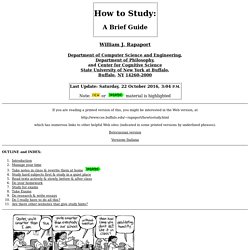

Study Skills. HOW TO STUDY. William J.

Rapaport Department of Computer Science and Engineering, Department of Philosophy, and Center for Cognitive ScienceState University of New York at Buffalo, Buffalo, NY14260-2000 If you are reading a printed version of this, you might be interested in the Web version, at which has numerous links to other helpful Web sites (indicated in some printed versions by underlined phrases). Belorussian version Versione Italiana OUTLINE and INDEX: 1. It has been claimed that everyone has a different "learning style".
But everyone surely has a different "studying style". More importantly, the way that you are studying right now might not be the best for you: How would you know? One important clarification before we begin: "Studying" is not the same thing as "doing homework"! Studying may include doing homework, but it is also a lot more, as you will see. I am going to give you some suggestions on how to study efficiently. Account Activated. 5 Bad Study Habits - Bad Study Habits You Should Avoid. Have you ever wondered how you can bomb a test after studying for hours?

A poor test result after many hours of faithful studying is a real confidence buster! If this happens to you, it’s possible that your current study habits are failing you! But you can turn it around. The process of learning is still a little mysterious, but studies do show that the most effective process for studying involves highly active behavior over a period of time.
In other words, to study effectively, you must read, draw, compare, memorize, and test yourself over time. The following study habits are least helpful when used alone. 1. Linear notes are lecture notes that students take when they attempt to write down every word of a lecture. You may be wondering: How can it be bad to capture every word of a lecture? It’s not bad to capture every word of a lecture, but it is bad to think you’re studying effectively if you don’t mess with your linear notes in some way. 2. Are you guilty of highlighter abuse? 3. 4. 5. How to Study. By Ronald C.

Blue Countless times students have asked me what is the best way to study. While the recommendations that I am about to make to you are no guarantee of success, I believe they will optimize your chances of success. Perspectives on the problem: Research shows that the average student will study for a test. College is different. It takes about one year to learn how to learn at a college level. 22 hours for an A (6 hours per week) 16 hours for a B (4 hours per week) 14 hours for a C (3.5 hours per week) 10 hours for a D (2.5 hours per week) 0 hours for an F (0 hours per week) An hour of study is defined as studying for 45 minutes and a break of 15 minutes. Research suggests that the slowest 10 percent of the students may need 5 to 6 times as much time to learn the same material as the fastest 10 percent. In other words, you can succeed if you pay the price necessary for success. The price of success: The price is too high you say.
How to get started: Believe you can succeed. Survey: Study Tips. Effective Study Skills. Everyone is different, and for some students, studying and being motivated to learn comes naturally.

If you are reading this page, it's likely that you are not one of them, but don't despair, there is hope! Your success in high school and college is dependent on your ability to study effectively and efficiently. The results of poor study skills are wasted time, frustration, and low or failing grades. It's your life, your time, and your future. All I can say, upon reflection of many years as a teacher, is that time is precious and not to be squandered, no matter what you believe right now. This guide is designed to help you develop effective study skills. Effective Study skills are about more than understanding.